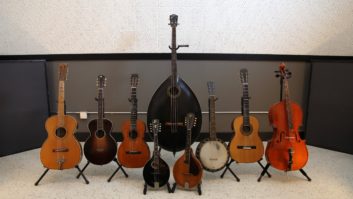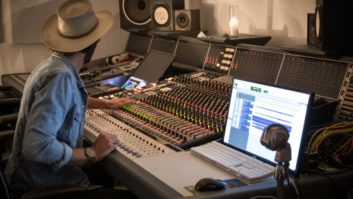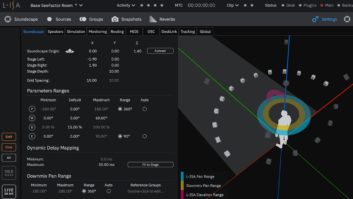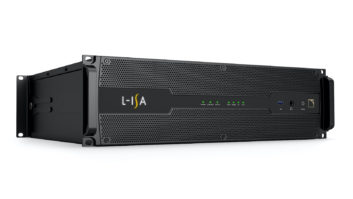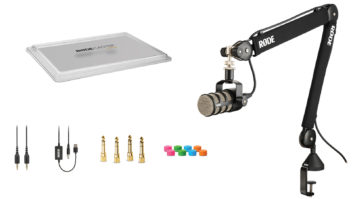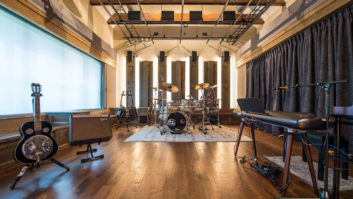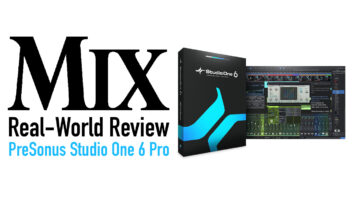LONDON, UK—Console designer David Dearden’s latest version of the audient ASP8024—the ASP8024-HE, or the Heritage edition—was recently installed at the London-based Institute of Contemporary Music (ICMP), where new studios have been christened for its burgeoning music production program. ICMP’s ASP8024-HE is one of the very first to leave the audient factory in Hampshire, England, and ICMP facilities manager Mike Sinnott could not be happier with the results.
“I was amazed at what Audient had done with the updates to the ASP8024 in the Heritage Edition,” offers Sinnott. “It sounds great and even better than earlier [Audient] models, especially in some of the mix buss updates. Our engineers that have used Audient for years have said they absolutely love working with it. There really is no other console at that price point that represents such value for the money. If you want to go beyond it, you’re looking at SSLs and Neves—which are great, but are a lot more expensive and honestly, more complicated for the students to work with.”
Though worksurface types will vary widely in the “real world,” Sinnott feels that his students will be best served by learning via the Audient’s translatable workflow. “This console reflects what most students would find in the field, as far as standard analog consoles are concerned. That is why—rather than a digital-centric, or even an Ethernet-based, network-centric studio install—we wanted to give our students the basics on plugging things in, allowing them to really understand signal flow. Using a desk like the Audient ASP8024-HE is a really good starting point, which is also why Audient remains a very popular choice for education.”
With new, unique features such as its Retro Iron variable mix buss featuring Low Bump and High Lift EQ parameters, mix buss compressor with Bass Expand, a splittable four-band EQ, configurable modular design, and more, the ASP8024-HE provides some interesting tools for ICMP, which took the opportunity to insert multiple producer panels into its layout, stretching its 24 channels over a broader space, then inserting an Avid S3 worksurface smack-dab in the middle.
“Now we have the both analog and digital workflows together,” says Sinnott. “If you simply drop a student into a situation with either an Avid S3 or an analog console like the SSL Duality—both options that are more complicated than the Audient alone—it’s a bit more of a challenging place [for students] to start. In the beginning of training on the Audient, it’s easy to understand where the signal is, because it’s very much ‘what you see is what you get.’ From there, it’s easier to grasp digital workflow through our combined analog and digital worksurface featuring the Avid S3.”
While educational and aural aspects were important in the Audient choice, aesthetic impact was key, too. After all, schools must attract students, and it was important to Sinnott that ICMP’s studio fluttered the hearts of potential pupils upon first sight.
“Along with being functional, we’re creating a space that needs to be appealing and satisfying,” Sinnott admits, in full recruitment mode. “Though our Audient is only a 24-channel desk, it was clear that by widening the desk with producer panels, it allowed the extra space we wanted and needed. That also allowed for the Avid S3 sitting on top, in the middle. All this together allowed us to create something unique. The Avid and Audient allow the studio to be more functional, and it is apparent how it would all work when you walk in and see it. Yes, there was an aesthetic consideration in putting this together, although the sound was the most important element, of course. There is a certain aspect of marketing a college where such a striking installation creates interest.”
Sinnott is proud of ICMP’s differences in its educational program, especially when directly compared to audio engineering schools found in broadcast and media-centric universities. “This institution is a contemporary music performance school,” he offers. “We originally started with drum, bass, guitar and vocal classes, and it began to move into the higher-education space, with degrees. That in turn developed into music business and songwriting; the next logical move was into music production. So one of the main differences between ICMP and other schools is that we only do music—nothing else. It is coming from the perspective of musicians and music performers. The course, rather than being an audio engineering program like some of the colleges offer, specifically focuses on the students’ music, which allows them to be take on a production role.”
Nurturing the next generation of producers necessitates new ways to look at the music business ecosystem, as today’s musicians are also distributors and multifaceted businesspeople. As Sinnott points out, it is about learning “whatever it takes” to get appreciated, distributed and paid.
“We look at the industry and how it has changed over the course of the past five to ten years,” he explains. “And, of course, those models have changed; the way people communicate and network are new, too. Ultimately, our students learn to be content creators and effective entrepreneurs, learning what to do once they create the content. It’s a 360-degree program. While there are the elements of recording engineering—with mic technique, signal flow and such—it is a creative music production-focused course.”
Audient
audient.com
Institute of Contemporary Music
http://icmp.ac.uk
